Entrepreneurship and Small Business Management Report for FSB
VerifiedAdded on 2019/12/28
|16
|5459
|156
Report
AI Summary
This report, prepared for the Federation of Small Business, delves into the multifaceted world of entrepreneurship and small business management. It begins by defining entrepreneurship and its significance, exploring various entrepreneurial ventures such as lifestyle, survival, managed growth, and aggressive growth ventures, and their relation to different types of entrepreneurship including small business, scalable start-up, large company, and social entrepreneurship. The report further examines the resemblance and differences among these ventures, highlighting their characteristics, roles, and objectives. It then analyzes the impact of micro and small businesses on the economy, covering their influence on local communities, regions, and the national and international economy. The report also emphasizes the significance of small businesses and start-ups in the development of the social economy, underscoring their role in job creation and economic growth. Finally, the report discusses factors contributing to entrepreneurial success, entrepreneurial personality traits, and potential hindrances to entrepreneurship, providing a comprehensive overview of the subject.

Entrepreneurship and
Small Business
Management
Small Business
Management
Paraphrase This Document
Need a fresh take? Get an instant paraphrase of this document with our AI Paraphraser
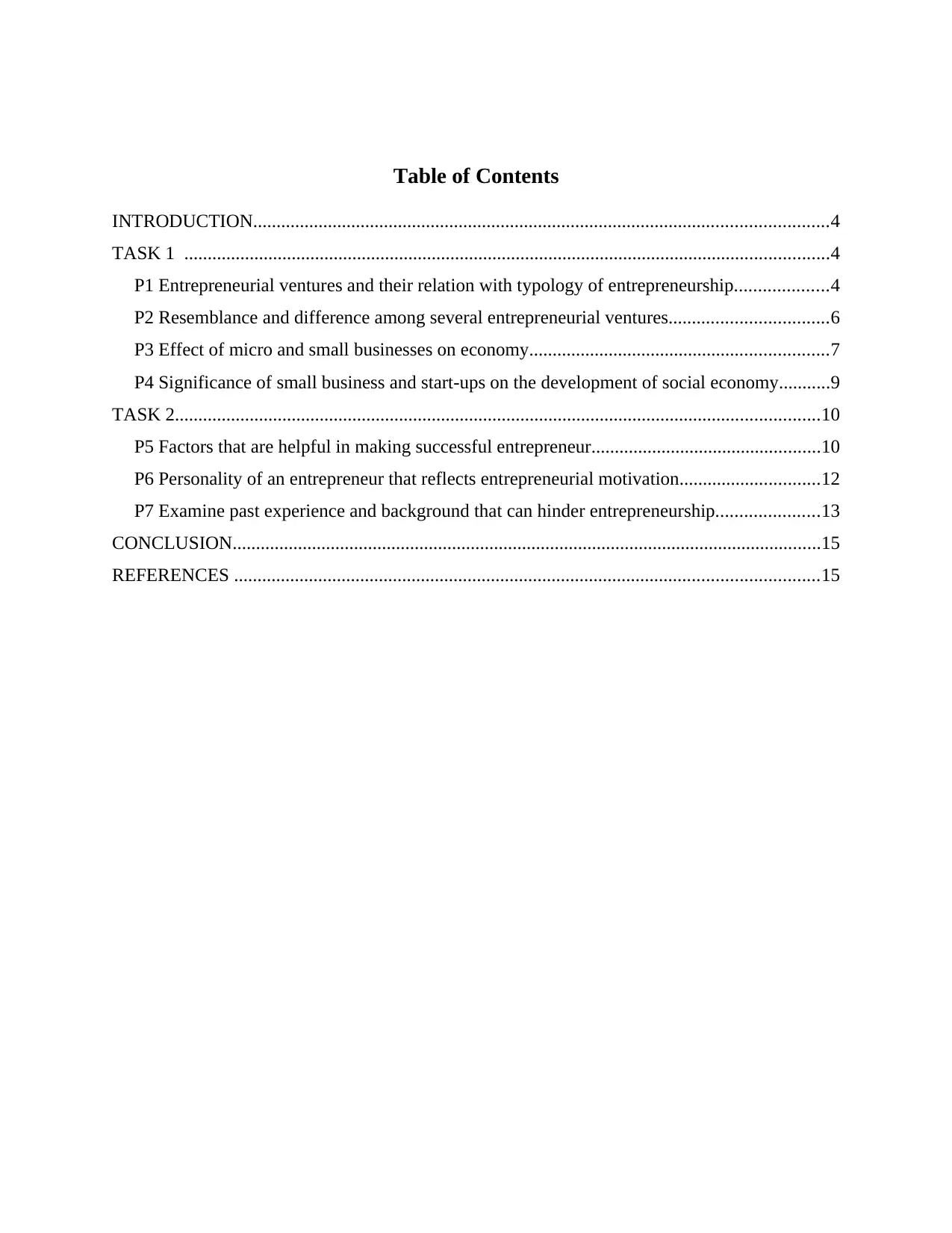
Table of Contents
INTRODUCTION...........................................................................................................................4
TASK 1 ..........................................................................................................................................4
P1 Entrepreneurial ventures and their relation with typology of entrepreneurship....................4
P2 Resemblance and difference among several entrepreneurial ventures..................................6
P3 Effect of micro and small businesses on economy................................................................7
P4 Significance of small business and start-ups on the development of social economy...........9
TASK 2..........................................................................................................................................10
P5 Factors that are helpful in making successful entrepreneur.................................................10
P6 Personality of an entrepreneur that reflects entrepreneurial motivation..............................12
P7 Examine past experience and background that can hinder entrepreneurship......................13
CONCLUSION..............................................................................................................................15
REFERENCES .............................................................................................................................15
INTRODUCTION...........................................................................................................................4
TASK 1 ..........................................................................................................................................4
P1 Entrepreneurial ventures and their relation with typology of entrepreneurship....................4
P2 Resemblance and difference among several entrepreneurial ventures..................................6
P3 Effect of micro and small businesses on economy................................................................7
P4 Significance of small business and start-ups on the development of social economy...........9
TASK 2..........................................................................................................................................10
P5 Factors that are helpful in making successful entrepreneur.................................................10
P6 Personality of an entrepreneur that reflects entrepreneurial motivation..............................12
P7 Examine past experience and background that can hinder entrepreneurship......................13
CONCLUSION..............................................................................................................................15
REFERENCES .............................................................................................................................15
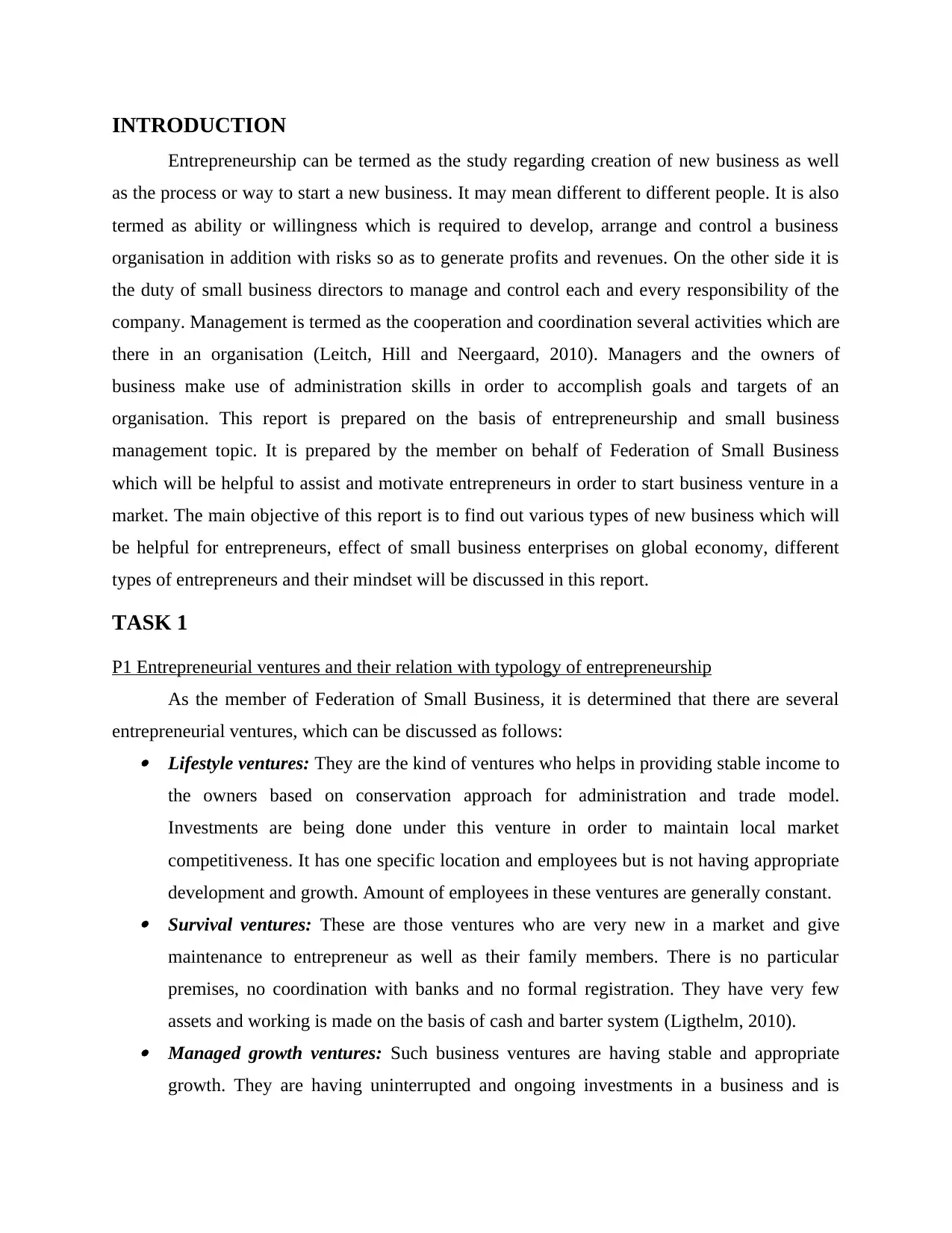
INTRODUCTION
Entrepreneurship can be termed as the study regarding creation of new business as well
as the process or way to start a new business. It may mean different to different people. It is also
termed as ability or willingness which is required to develop, arrange and control a business
organisation in addition with risks so as to generate profits and revenues. On the other side it is
the duty of small business directors to manage and control each and every responsibility of the
company. Management is termed as the cooperation and coordination several activities which are
there in an organisation (Leitch, Hill and Neergaard, 2010). Managers and the owners of
business make use of administration skills in order to accomplish goals and targets of an
organisation. This report is prepared on the basis of entrepreneurship and small business
management topic. It is prepared by the member on behalf of Federation of Small Business
which will be helpful to assist and motivate entrepreneurs in order to start business venture in a
market. The main objective of this report is to find out various types of new business which will
be helpful for entrepreneurs, effect of small business enterprises on global economy, different
types of entrepreneurs and their mindset will be discussed in this report.
TASK 1
P1 Entrepreneurial ventures and their relation with typology of entrepreneurship
As the member of Federation of Small Business, it is determined that there are several
entrepreneurial ventures, which can be discussed as follows: Lifestyle ventures: They are the kind of ventures who helps in providing stable income to
the owners based on conservation approach for administration and trade model.
Investments are being done under this venture in order to maintain local market
competitiveness. It has one specific location and employees but is not having appropriate
development and growth. Amount of employees in these ventures are generally constant. Survival ventures: These are those ventures who are very new in a market and give
maintenance to entrepreneur as well as their family members. There is no particular
premises, no coordination with banks and no formal registration. They have very few
assets and working is made on the basis of cash and barter system (Ligthelm, 2010). Managed growth ventures: Such business ventures are having stable and appropriate
growth. They are having uninterrupted and ongoing investments in a business and is
Entrepreneurship can be termed as the study regarding creation of new business as well
as the process or way to start a new business. It may mean different to different people. It is also
termed as ability or willingness which is required to develop, arrange and control a business
organisation in addition with risks so as to generate profits and revenues. On the other side it is
the duty of small business directors to manage and control each and every responsibility of the
company. Management is termed as the cooperation and coordination several activities which are
there in an organisation (Leitch, Hill and Neergaard, 2010). Managers and the owners of
business make use of administration skills in order to accomplish goals and targets of an
organisation. This report is prepared on the basis of entrepreneurship and small business
management topic. It is prepared by the member on behalf of Federation of Small Business
which will be helpful to assist and motivate entrepreneurs in order to start business venture in a
market. The main objective of this report is to find out various types of new business which will
be helpful for entrepreneurs, effect of small business enterprises on global economy, different
types of entrepreneurs and their mindset will be discussed in this report.
TASK 1
P1 Entrepreneurial ventures and their relation with typology of entrepreneurship
As the member of Federation of Small Business, it is determined that there are several
entrepreneurial ventures, which can be discussed as follows: Lifestyle ventures: They are the kind of ventures who helps in providing stable income to
the owners based on conservation approach for administration and trade model.
Investments are being done under this venture in order to maintain local market
competitiveness. It has one specific location and employees but is not having appropriate
development and growth. Amount of employees in these ventures are generally constant. Survival ventures: These are those ventures who are very new in a market and give
maintenance to entrepreneur as well as their family members. There is no particular
premises, no coordination with banks and no formal registration. They have very few
assets and working is made on the basis of cash and barter system (Ligthelm, 2010). Managed growth ventures: Such business ventures are having stable and appropriate
growth. They are having uninterrupted and ongoing investments in a business and is
⊘ This is a preview!⊘
Do you want full access?
Subscribe today to unlock all pages.

Trusted by 1+ million students worldwide
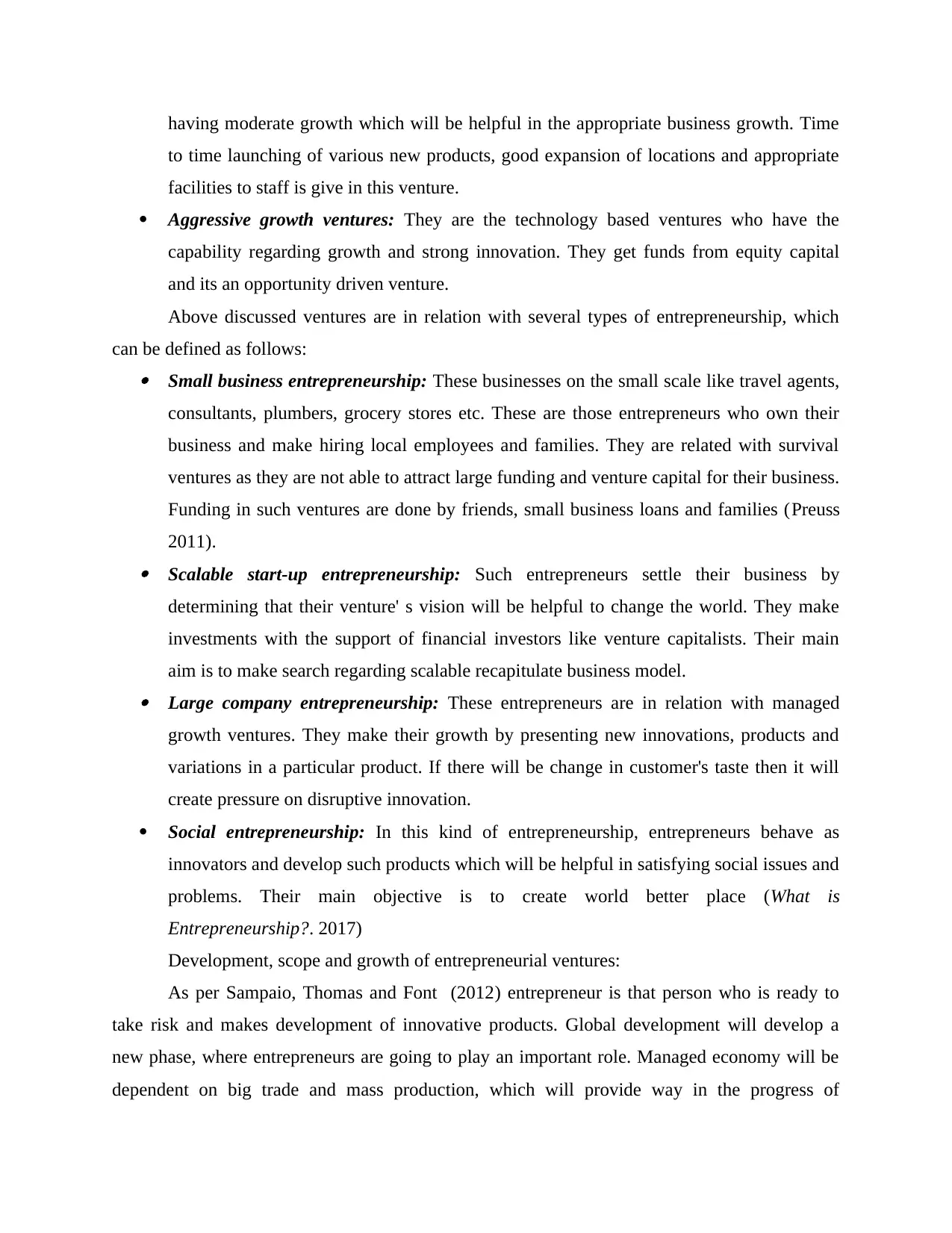
having moderate growth which will be helpful in the appropriate business growth. Time
to time launching of various new products, good expansion of locations and appropriate
facilities to staff is give in this venture.
Aggressive growth ventures: They are the technology based ventures who have the
capability regarding growth and strong innovation. They get funds from equity capital
and its an opportunity driven venture.
Above discussed ventures are in relation with several types of entrepreneurship, which
can be defined as follows: Small business entrepreneurship: These businesses on the small scale like travel agents,
consultants, plumbers, grocery stores etc. These are those entrepreneurs who own their
business and make hiring local employees and families. They are related with survival
ventures as they are not able to attract large funding and venture capital for their business.
Funding in such ventures are done by friends, small business loans and families (Preuss
2011). Scalable start-up entrepreneurship: Such entrepreneurs settle their business by
determining that their venture' s vision will be helpful to change the world. They make
investments with the support of financial investors like venture capitalists. Their main
aim is to make search regarding scalable recapitulate business model. Large company entrepreneurship: These entrepreneurs are in relation with managed
growth ventures. They make their growth by presenting new innovations, products and
variations in a particular product. If there will be change in customer's taste then it will
create pressure on disruptive innovation.
Social entrepreneurship: In this kind of entrepreneurship, entrepreneurs behave as
innovators and develop such products which will be helpful in satisfying social issues and
problems. Their main objective is to create world better place (What is
Entrepreneurship?. 2017)
Development, scope and growth of entrepreneurial ventures:
As per Sampaio, Thomas and Font (2012) entrepreneur is that person who is ready to
take risk and makes development of innovative products. Global development will develop a
new phase, where entrepreneurs are going to play an important role. Managed economy will be
dependent on big trade and mass production, which will provide way in the progress of
to time launching of various new products, good expansion of locations and appropriate
facilities to staff is give in this venture.
Aggressive growth ventures: They are the technology based ventures who have the
capability regarding growth and strong innovation. They get funds from equity capital
and its an opportunity driven venture.
Above discussed ventures are in relation with several types of entrepreneurship, which
can be defined as follows: Small business entrepreneurship: These businesses on the small scale like travel agents,
consultants, plumbers, grocery stores etc. These are those entrepreneurs who own their
business and make hiring local employees and families. They are related with survival
ventures as they are not able to attract large funding and venture capital for their business.
Funding in such ventures are done by friends, small business loans and families (Preuss
2011). Scalable start-up entrepreneurship: Such entrepreneurs settle their business by
determining that their venture' s vision will be helpful to change the world. They make
investments with the support of financial investors like venture capitalists. Their main
aim is to make search regarding scalable recapitulate business model. Large company entrepreneurship: These entrepreneurs are in relation with managed
growth ventures. They make their growth by presenting new innovations, products and
variations in a particular product. If there will be change in customer's taste then it will
create pressure on disruptive innovation.
Social entrepreneurship: In this kind of entrepreneurship, entrepreneurs behave as
innovators and develop such products which will be helpful in satisfying social issues and
problems. Their main objective is to create world better place (What is
Entrepreneurship?. 2017)
Development, scope and growth of entrepreneurial ventures:
As per Sampaio, Thomas and Font (2012) entrepreneur is that person who is ready to
take risk and makes development of innovative products. Global development will develop a
new phase, where entrepreneurs are going to play an important role. Managed economy will be
dependent on big trade and mass production, which will provide way in the progress of
Paraphrase This Document
Need a fresh take? Get an instant paraphrase of this document with our AI Paraphraser
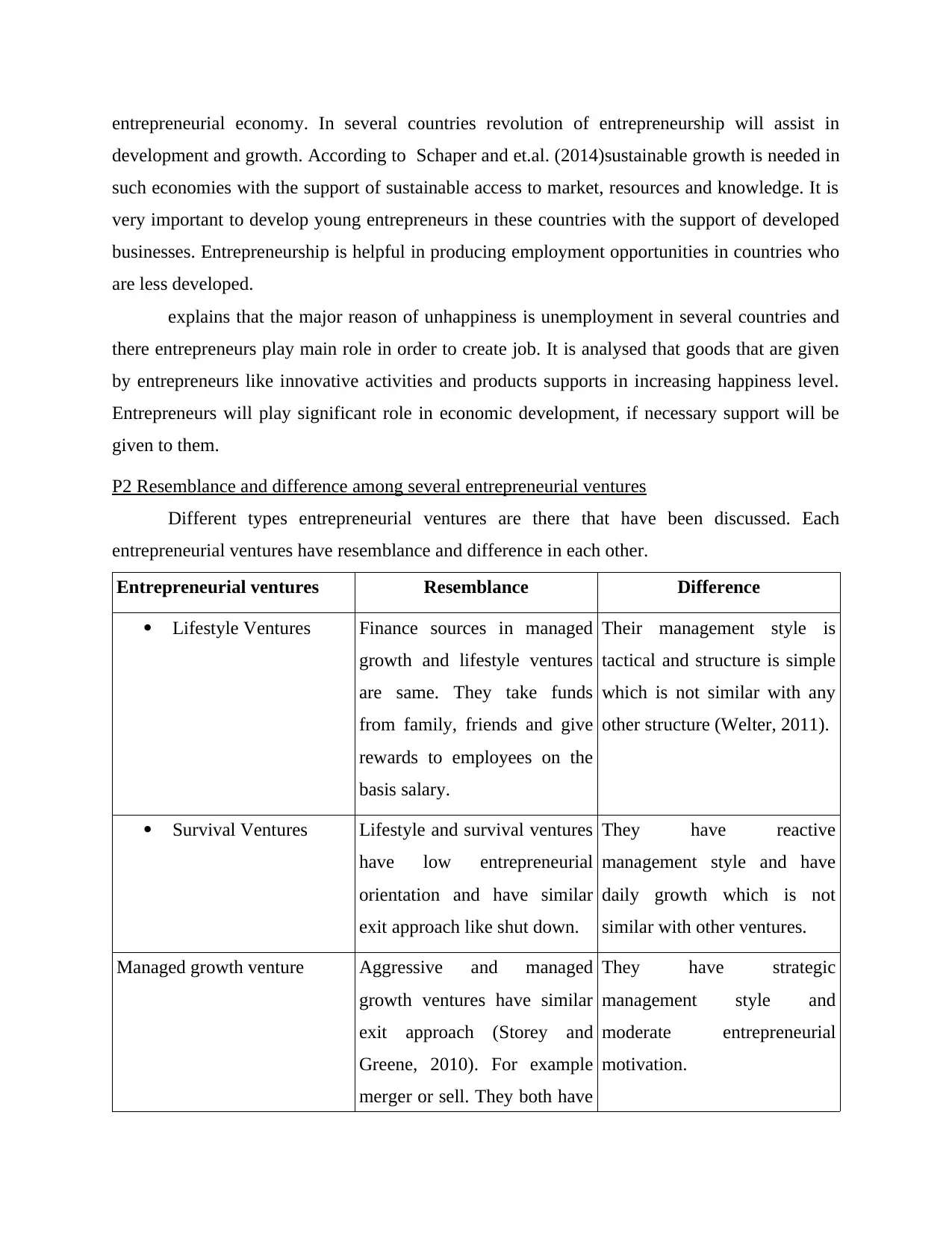
entrepreneurial economy. In several countries revolution of entrepreneurship will assist in
development and growth. According to Schaper and et.al. (2014)sustainable growth is needed in
such economies with the support of sustainable access to market, resources and knowledge. It is
very important to develop young entrepreneurs in these countries with the support of developed
businesses. Entrepreneurship is helpful in producing employment opportunities in countries who
are less developed.
explains that the major reason of unhappiness is unemployment in several countries and
there entrepreneurs play main role in order to create job. It is analysed that goods that are given
by entrepreneurs like innovative activities and products supports in increasing happiness level.
Entrepreneurs will play significant role in economic development, if necessary support will be
given to them.
P2 Resemblance and difference among several entrepreneurial ventures
Different types entrepreneurial ventures are there that have been discussed. Each
entrepreneurial ventures have resemblance and difference in each other.
Entrepreneurial ventures Resemblance Difference
Lifestyle Ventures Finance sources in managed
growth and lifestyle ventures
are same. They take funds
from family, friends and give
rewards to employees on the
basis salary.
Their management style is
tactical and structure is simple
which is not similar with any
other structure (Welter, 2011).
Survival Ventures Lifestyle and survival ventures
have low entrepreneurial
orientation and have similar
exit approach like shut down.
They have reactive
management style and have
daily growth which is not
similar with other ventures.
Managed growth venture Aggressive and managed
growth ventures have similar
exit approach (Storey and
Greene, 2010). For example
merger or sell. They both have
They have strategic
management style and
moderate entrepreneurial
motivation.
development and growth. According to Schaper and et.al. (2014)sustainable growth is needed in
such economies with the support of sustainable access to market, resources and knowledge. It is
very important to develop young entrepreneurs in these countries with the support of developed
businesses. Entrepreneurship is helpful in producing employment opportunities in countries who
are less developed.
explains that the major reason of unhappiness is unemployment in several countries and
there entrepreneurs play main role in order to create job. It is analysed that goods that are given
by entrepreneurs like innovative activities and products supports in increasing happiness level.
Entrepreneurs will play significant role in economic development, if necessary support will be
given to them.
P2 Resemblance and difference among several entrepreneurial ventures
Different types entrepreneurial ventures are there that have been discussed. Each
entrepreneurial ventures have resemblance and difference in each other.
Entrepreneurial ventures Resemblance Difference
Lifestyle Ventures Finance sources in managed
growth and lifestyle ventures
are same. They take funds
from family, friends and give
rewards to employees on the
basis salary.
Their management style is
tactical and structure is simple
which is not similar with any
other structure (Welter, 2011).
Survival Ventures Lifestyle and survival ventures
have low entrepreneurial
orientation and have similar
exit approach like shut down.
They have reactive
management style and have
daily growth which is not
similar with other ventures.
Managed growth venture Aggressive and managed
growth ventures have similar
exit approach (Storey and
Greene, 2010). For example
merger or sell. They both have
They have strategic
management style and
moderate entrepreneurial
motivation.
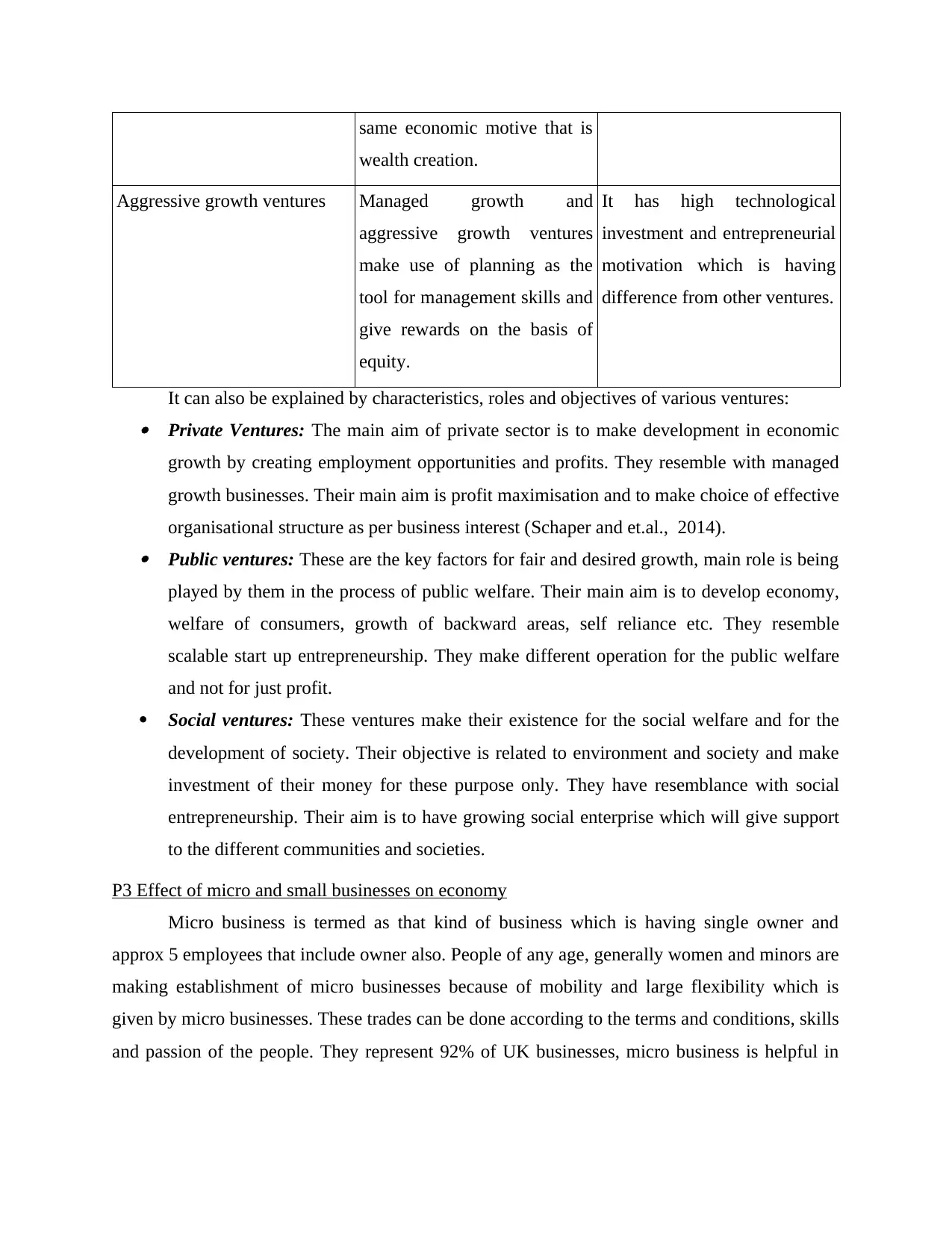
same economic motive that is
wealth creation.
Aggressive growth ventures Managed growth and
aggressive growth ventures
make use of planning as the
tool for management skills and
give rewards on the basis of
equity.
It has high technological
investment and entrepreneurial
motivation which is having
difference from other ventures.
It can also be explained by characteristics, roles and objectives of various ventures: Private Ventures: The main aim of private sector is to make development in economic
growth by creating employment opportunities and profits. They resemble with managed
growth businesses. Their main aim is profit maximisation and to make choice of effective
organisational structure as per business interest (Schaper and et.al., 2014). Public ventures: These are the key factors for fair and desired growth, main role is being
played by them in the process of public welfare. Their main aim is to develop economy,
welfare of consumers, growth of backward areas, self reliance etc. They resemble
scalable start up entrepreneurship. They make different operation for the public welfare
and not for just profit.
Social ventures: These ventures make their existence for the social welfare and for the
development of society. Their objective is related to environment and society and make
investment of their money for these purpose only. They have resemblance with social
entrepreneurship. Their aim is to have growing social enterprise which will give support
to the different communities and societies.
P3 Effect of micro and small businesses on economy
Micro business is termed as that kind of business which is having single owner and
approx 5 employees that include owner also. People of any age, generally women and minors are
making establishment of micro businesses because of mobility and large flexibility which is
given by micro businesses. These trades can be done according to the terms and conditions, skills
and passion of the people. They represent 92% of UK businesses, micro business is helpful in
wealth creation.
Aggressive growth ventures Managed growth and
aggressive growth ventures
make use of planning as the
tool for management skills and
give rewards on the basis of
equity.
It has high technological
investment and entrepreneurial
motivation which is having
difference from other ventures.
It can also be explained by characteristics, roles and objectives of various ventures: Private Ventures: The main aim of private sector is to make development in economic
growth by creating employment opportunities and profits. They resemble with managed
growth businesses. Their main aim is profit maximisation and to make choice of effective
organisational structure as per business interest (Schaper and et.al., 2014). Public ventures: These are the key factors for fair and desired growth, main role is being
played by them in the process of public welfare. Their main aim is to develop economy,
welfare of consumers, growth of backward areas, self reliance etc. They resemble
scalable start up entrepreneurship. They make different operation for the public welfare
and not for just profit.
Social ventures: These ventures make their existence for the social welfare and for the
development of society. Their objective is related to environment and society and make
investment of their money for these purpose only. They have resemblance with social
entrepreneurship. Their aim is to have growing social enterprise which will give support
to the different communities and societies.
P3 Effect of micro and small businesses on economy
Micro business is termed as that kind of business which is having single owner and
approx 5 employees that include owner also. People of any age, generally women and minors are
making establishment of micro businesses because of mobility and large flexibility which is
given by micro businesses. These trades can be done according to the terms and conditions, skills
and passion of the people. They represent 92% of UK businesses, micro business is helpful in
⊘ This is a preview!⊘
Do you want full access?
Subscribe today to unlock all pages.

Trusted by 1+ million students worldwide
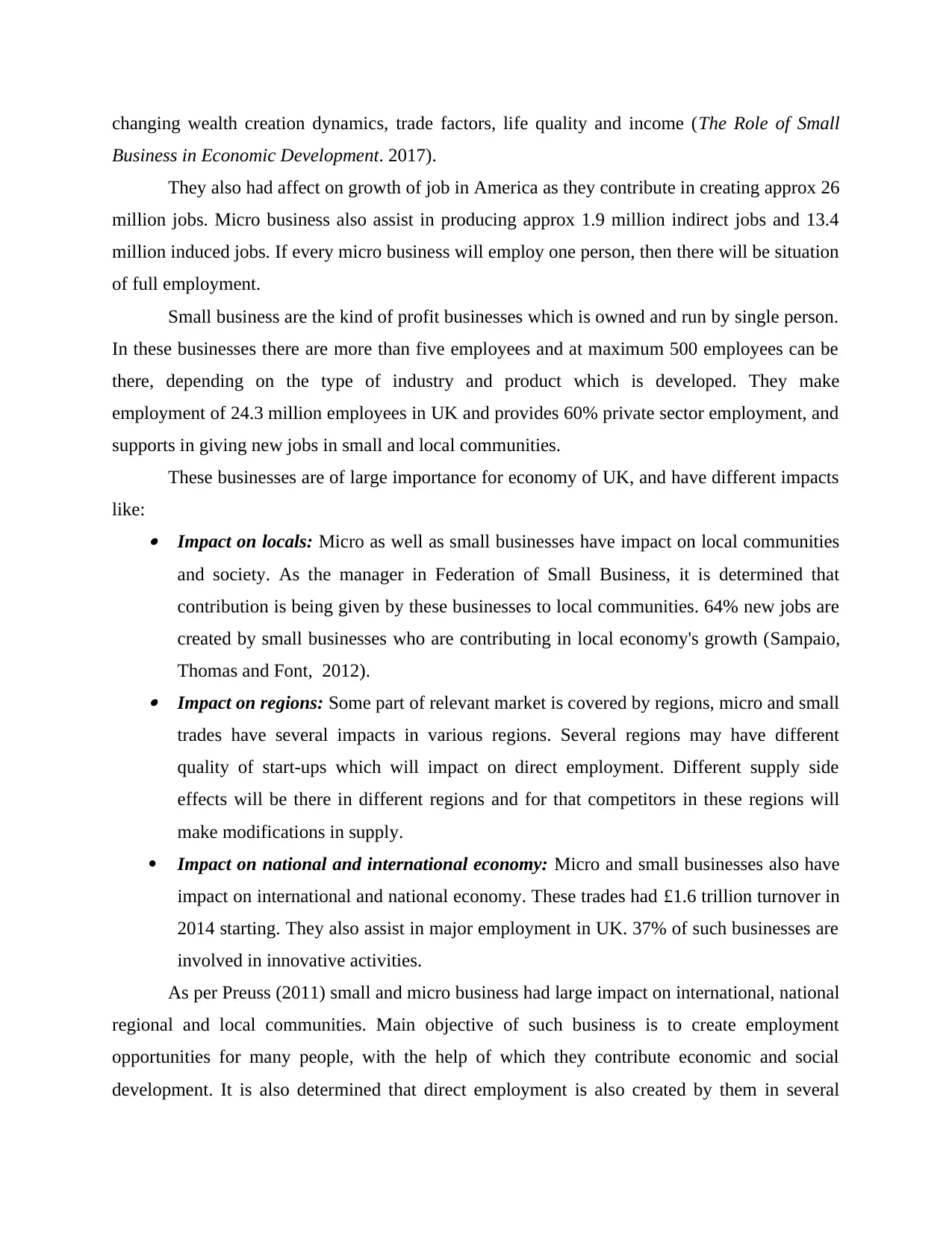
changing wealth creation dynamics, trade factors, life quality and income (The Role of Small
Business in Economic Development. 2017).
They also had affect on growth of job in America as they contribute in creating approx 26
million jobs. Micro business also assist in producing approx 1.9 million indirect jobs and 13.4
million induced jobs. If every micro business will employ one person, then there will be situation
of full employment.
Small business are the kind of profit businesses which is owned and run by single person.
In these businesses there are more than five employees and at maximum 500 employees can be
there, depending on the type of industry and product which is developed. They make
employment of 24.3 million employees in UK and provides 60% private sector employment, and
supports in giving new jobs in small and local communities.
These businesses are of large importance for economy of UK, and have different impacts
like: Impact on locals: Micro as well as small businesses have impact on local communities
and society. As the manager in Federation of Small Business, it is determined that
contribution is being given by these businesses to local communities. 64% new jobs are
created by small businesses who are contributing in local economy's growth (Sampaio,
Thomas and Font, 2012). Impact on regions: Some part of relevant market is covered by regions, micro and small
trades have several impacts in various regions. Several regions may have different
quality of start-ups which will impact on direct employment. Different supply side
effects will be there in different regions and for that competitors in these regions will
make modifications in supply.
Impact on national and international economy: Micro and small businesses also have
impact on international and national economy. These trades had £1.6 trillion turnover in
2014 starting. They also assist in major employment in UK. 37% of such businesses are
involved in innovative activities.
As per Preuss (2011) small and micro business had large impact on international, national
regional and local communities. Main objective of such business is to create employment
opportunities for many people, with the help of which they contribute economic and social
development. It is also determined that direct employment is also created by them in several
Business in Economic Development. 2017).
They also had affect on growth of job in America as they contribute in creating approx 26
million jobs. Micro business also assist in producing approx 1.9 million indirect jobs and 13.4
million induced jobs. If every micro business will employ one person, then there will be situation
of full employment.
Small business are the kind of profit businesses which is owned and run by single person.
In these businesses there are more than five employees and at maximum 500 employees can be
there, depending on the type of industry and product which is developed. They make
employment of 24.3 million employees in UK and provides 60% private sector employment, and
supports in giving new jobs in small and local communities.
These businesses are of large importance for economy of UK, and have different impacts
like: Impact on locals: Micro as well as small businesses have impact on local communities
and society. As the manager in Federation of Small Business, it is determined that
contribution is being given by these businesses to local communities. 64% new jobs are
created by small businesses who are contributing in local economy's growth (Sampaio,
Thomas and Font, 2012). Impact on regions: Some part of relevant market is covered by regions, micro and small
trades have several impacts in various regions. Several regions may have different
quality of start-ups which will impact on direct employment. Different supply side
effects will be there in different regions and for that competitors in these regions will
make modifications in supply.
Impact on national and international economy: Micro and small businesses also have
impact on international and national economy. These trades had £1.6 trillion turnover in
2014 starting. They also assist in major employment in UK. 37% of such businesses are
involved in innovative activities.
As per Preuss (2011) small and micro business had large impact on international, national
regional and local communities. Main objective of such business is to create employment
opportunities for many people, with the help of which they contribute economic and social
development. It is also determined that direct employment is also created by them in several
Paraphrase This Document
Need a fresh take? Get an instant paraphrase of this document with our AI Paraphraser
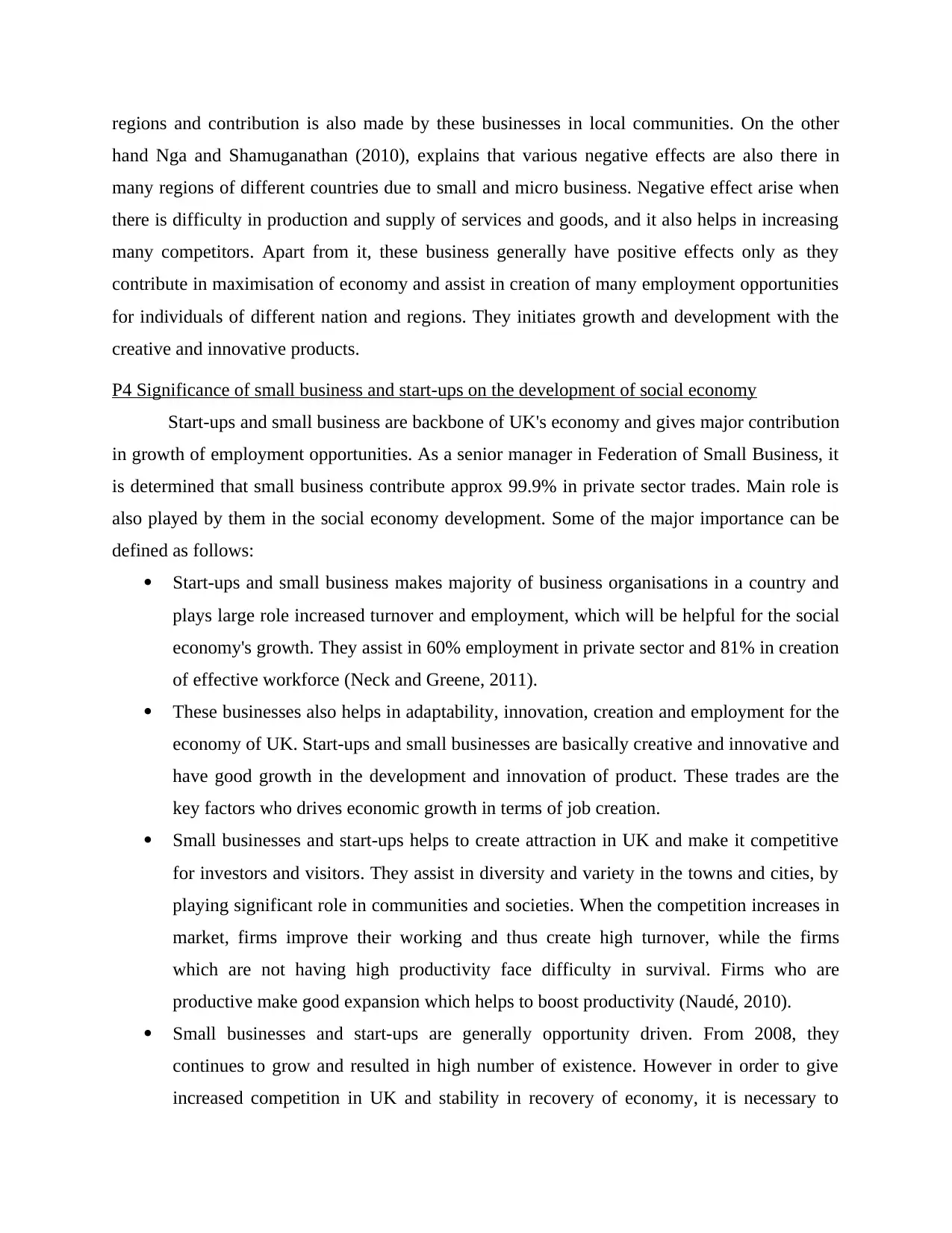
regions and contribution is also made by these businesses in local communities. On the other
hand Nga and Shamuganathan (2010), explains that various negative effects are also there in
many regions of different countries due to small and micro business. Negative effect arise when
there is difficulty in production and supply of services and goods, and it also helps in increasing
many competitors. Apart from it, these business generally have positive effects only as they
contribute in maximisation of economy and assist in creation of many employment opportunities
for individuals of different nation and regions. They initiates growth and development with the
creative and innovative products.
P4 Significance of small business and start-ups on the development of social economy
Start-ups and small business are backbone of UK's economy and gives major contribution
in growth of employment opportunities. As a senior manager in Federation of Small Business, it
is determined that small business contribute approx 99.9% in private sector trades. Main role is
also played by them in the social economy development. Some of the major importance can be
defined as follows:
Start-ups and small business makes majority of business organisations in a country and
plays large role increased turnover and employment, which will be helpful for the social
economy's growth. They assist in 60% employment in private sector and 81% in creation
of effective workforce (Neck and Greene, 2011).
These businesses also helps in adaptability, innovation, creation and employment for the
economy of UK. Start-ups and small businesses are basically creative and innovative and
have good growth in the development and innovation of product. These trades are the
key factors who drives economic growth in terms of job creation.
Small businesses and start-ups helps to create attraction in UK and make it competitive
for investors and visitors. They assist in diversity and variety in the towns and cities, by
playing significant role in communities and societies. When the competition increases in
market, firms improve their working and thus create high turnover, while the firms
which are not having high productivity face difficulty in survival. Firms who are
productive make good expansion which helps to boost productivity (Naudé, 2010).
Small businesses and start-ups are generally opportunity driven. From 2008, they
continues to grow and resulted in high number of existence. However in order to give
increased competition in UK and stability in recovery of economy, it is necessary to
hand Nga and Shamuganathan (2010), explains that various negative effects are also there in
many regions of different countries due to small and micro business. Negative effect arise when
there is difficulty in production and supply of services and goods, and it also helps in increasing
many competitors. Apart from it, these business generally have positive effects only as they
contribute in maximisation of economy and assist in creation of many employment opportunities
for individuals of different nation and regions. They initiates growth and development with the
creative and innovative products.
P4 Significance of small business and start-ups on the development of social economy
Start-ups and small business are backbone of UK's economy and gives major contribution
in growth of employment opportunities. As a senior manager in Federation of Small Business, it
is determined that small business contribute approx 99.9% in private sector trades. Main role is
also played by them in the social economy development. Some of the major importance can be
defined as follows:
Start-ups and small business makes majority of business organisations in a country and
plays large role increased turnover and employment, which will be helpful for the social
economy's growth. They assist in 60% employment in private sector and 81% in creation
of effective workforce (Neck and Greene, 2011).
These businesses also helps in adaptability, innovation, creation and employment for the
economy of UK. Start-ups and small businesses are basically creative and innovative and
have good growth in the development and innovation of product. These trades are the
key factors who drives economic growth in terms of job creation.
Small businesses and start-ups helps to create attraction in UK and make it competitive
for investors and visitors. They assist in diversity and variety in the towns and cities, by
playing significant role in communities and societies. When the competition increases in
market, firms improve their working and thus create high turnover, while the firms
which are not having high productivity face difficulty in survival. Firms who are
productive make good expansion which helps to boost productivity (Naudé, 2010).
Small businesses and start-ups are generally opportunity driven. From 2008, they
continues to grow and resulted in high number of existence. However in order to give
increased competition in UK and stability in recovery of economy, it is necessary to
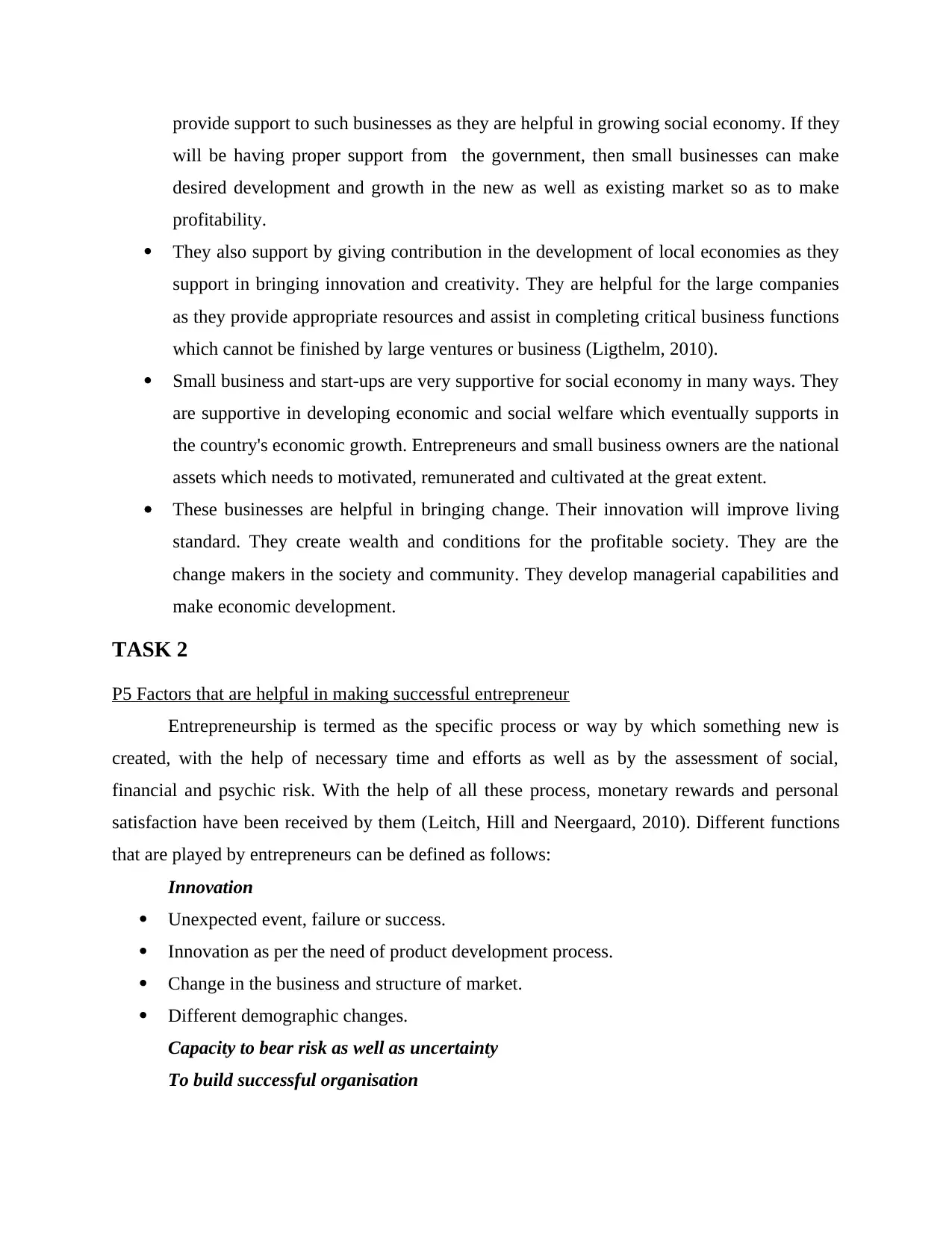
provide support to such businesses as they are helpful in growing social economy. If they
will be having proper support from the government, then small businesses can make
desired development and growth in the new as well as existing market so as to make
profitability.
They also support by giving contribution in the development of local economies as they
support in bringing innovation and creativity. They are helpful for the large companies
as they provide appropriate resources and assist in completing critical business functions
which cannot be finished by large ventures or business (Ligthelm, 2010).
Small business and start-ups are very supportive for social economy in many ways. They
are supportive in developing economic and social welfare which eventually supports in
the country's economic growth. Entrepreneurs and small business owners are the national
assets which needs to motivated, remunerated and cultivated at the great extent.
These businesses are helpful in bringing change. Their innovation will improve living
standard. They create wealth and conditions for the profitable society. They are the
change makers in the society and community. They develop managerial capabilities and
make economic development.
TASK 2
P5 Factors that are helpful in making successful entrepreneur
Entrepreneurship is termed as the specific process or way by which something new is
created, with the help of necessary time and efforts as well as by the assessment of social,
financial and psychic risk. With the help of all these process, monetary rewards and personal
satisfaction have been received by them (Leitch, Hill and Neergaard, 2010). Different functions
that are played by entrepreneurs can be defined as follows:
Innovation
Unexpected event, failure or success.
Innovation as per the need of product development process.
Change in the business and structure of market.
Different demographic changes.
Capacity to bear risk as well as uncertainty
To build successful organisation
will be having proper support from the government, then small businesses can make
desired development and growth in the new as well as existing market so as to make
profitability.
They also support by giving contribution in the development of local economies as they
support in bringing innovation and creativity. They are helpful for the large companies
as they provide appropriate resources and assist in completing critical business functions
which cannot be finished by large ventures or business (Ligthelm, 2010).
Small business and start-ups are very supportive for social economy in many ways. They
are supportive in developing economic and social welfare which eventually supports in
the country's economic growth. Entrepreneurs and small business owners are the national
assets which needs to motivated, remunerated and cultivated at the great extent.
These businesses are helpful in bringing change. Their innovation will improve living
standard. They create wealth and conditions for the profitable society. They are the
change makers in the society and community. They develop managerial capabilities and
make economic development.
TASK 2
P5 Factors that are helpful in making successful entrepreneur
Entrepreneurship is termed as the specific process or way by which something new is
created, with the help of necessary time and efforts as well as by the assessment of social,
financial and psychic risk. With the help of all these process, monetary rewards and personal
satisfaction have been received by them (Leitch, Hill and Neergaard, 2010). Different functions
that are played by entrepreneurs can be defined as follows:
Innovation
Unexpected event, failure or success.
Innovation as per the need of product development process.
Change in the business and structure of market.
Different demographic changes.
Capacity to bear risk as well as uncertainty
To build successful organisation
⊘ This is a preview!⊘
Do you want full access?
Subscribe today to unlock all pages.

Trusted by 1+ million students worldwide
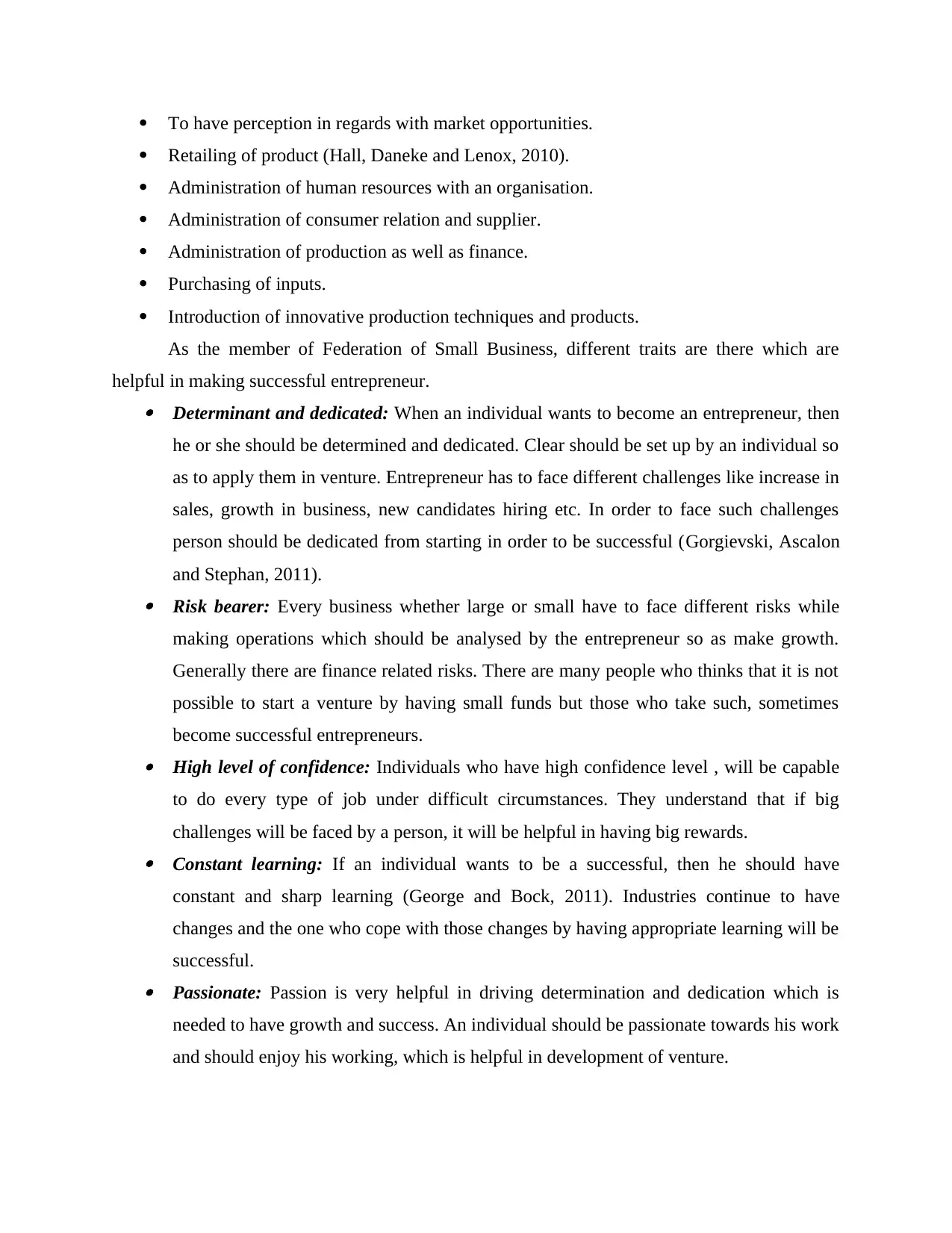
To have perception in regards with market opportunities.
Retailing of product (Hall, Daneke and Lenox, 2010).
Administration of human resources with an organisation.
Administration of consumer relation and supplier.
Administration of production as well as finance.
Purchasing of inputs.
Introduction of innovative production techniques and products.
As the member of Federation of Small Business, different traits are there which are
helpful in making successful entrepreneur. Determinant and dedicated: When an individual wants to become an entrepreneur, then
he or she should be determined and dedicated. Clear should be set up by an individual so
as to apply them in venture. Entrepreneur has to face different challenges like increase in
sales, growth in business, new candidates hiring etc. In order to face such challenges
person should be dedicated from starting in order to be successful (Gorgievski, Ascalon
and Stephan, 2011). Risk bearer: Every business whether large or small have to face different risks while
making operations which should be analysed by the entrepreneur so as make growth.
Generally there are finance related risks. There are many people who thinks that it is not
possible to start a venture by having small funds but those who take such, sometimes
become successful entrepreneurs. High level of confidence: Individuals who have high confidence level , will be capable
to do every type of job under difficult circumstances. They understand that if big
challenges will be faced by a person, it will be helpful in having big rewards. Constant learning: If an individual wants to be a successful, then he should have
constant and sharp learning (George and Bock, 2011). Industries continue to have
changes and the one who cope with those changes by having appropriate learning will be
successful. Passionate: Passion is very helpful in driving determination and dedication which is
needed to have growth and success. An individual should be passionate towards his work
and should enjoy his working, which is helpful in development of venture.
Retailing of product (Hall, Daneke and Lenox, 2010).
Administration of human resources with an organisation.
Administration of consumer relation and supplier.
Administration of production as well as finance.
Purchasing of inputs.
Introduction of innovative production techniques and products.
As the member of Federation of Small Business, different traits are there which are
helpful in making successful entrepreneur. Determinant and dedicated: When an individual wants to become an entrepreneur, then
he or she should be determined and dedicated. Clear should be set up by an individual so
as to apply them in venture. Entrepreneur has to face different challenges like increase in
sales, growth in business, new candidates hiring etc. In order to face such challenges
person should be dedicated from starting in order to be successful (Gorgievski, Ascalon
and Stephan, 2011). Risk bearer: Every business whether large or small have to face different risks while
making operations which should be analysed by the entrepreneur so as make growth.
Generally there are finance related risks. There are many people who thinks that it is not
possible to start a venture by having small funds but those who take such, sometimes
become successful entrepreneurs. High level of confidence: Individuals who have high confidence level , will be capable
to do every type of job under difficult circumstances. They understand that if big
challenges will be faced by a person, it will be helpful in having big rewards. Constant learning: If an individual wants to be a successful, then he should have
constant and sharp learning (George and Bock, 2011). Industries continue to have
changes and the one who cope with those changes by having appropriate learning will be
successful. Passionate: Passion is very helpful in driving determination and dedication which is
needed to have growth and success. An individual should be passionate towards his work
and should enjoy his working, which is helpful in development of venture.
Paraphrase This Document
Need a fresh take? Get an instant paraphrase of this document with our AI Paraphraser
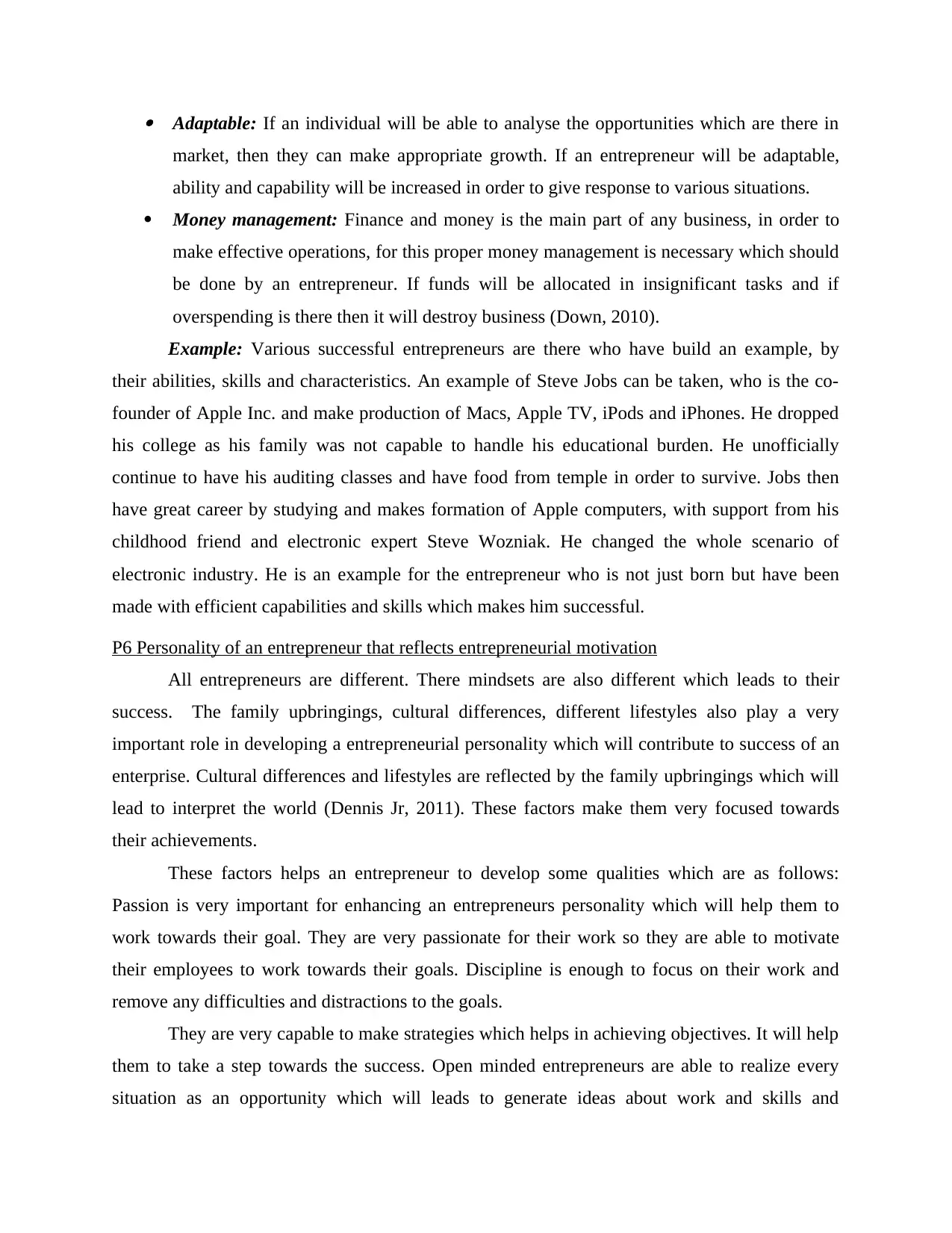
Adaptable: If an individual will be able to analyse the opportunities which are there in
market, then they can make appropriate growth. If an entrepreneur will be adaptable,
ability and capability will be increased in order to give response to various situations.
Money management: Finance and money is the main part of any business, in order to
make effective operations, for this proper money management is necessary which should
be done by an entrepreneur. If funds will be allocated in insignificant tasks and if
overspending is there then it will destroy business (Down, 2010).
Example: Various successful entrepreneurs are there who have build an example, by
their abilities, skills and characteristics. An example of Steve Jobs can be taken, who is the co-
founder of Apple Inc. and make production of Macs, Apple TV, iPods and iPhones. He dropped
his college as his family was not capable to handle his educational burden. He unofficially
continue to have his auditing classes and have food from temple in order to survive. Jobs then
have great career by studying and makes formation of Apple computers, with support from his
childhood friend and electronic expert Steve Wozniak. He changed the whole scenario of
electronic industry. He is an example for the entrepreneur who is not just born but have been
made with efficient capabilities and skills which makes him successful.
P6 Personality of an entrepreneur that reflects entrepreneurial motivation
All entrepreneurs are different. There mindsets are also different which leads to their
success. The family upbringings, cultural differences, different lifestyles also play a very
important role in developing a entrepreneurial personality which will contribute to success of an
enterprise. Cultural differences and lifestyles are reflected by the family upbringings which will
lead to interpret the world (Dennis Jr, 2011). These factors make them very focused towards
their achievements.
These factors helps an entrepreneur to develop some qualities which are as follows:
Passion is very important for enhancing an entrepreneurs personality which will help them to
work towards their goal. They are very passionate for their work so they are able to motivate
their employees to work towards their goals. Discipline is enough to focus on their work and
remove any difficulties and distractions to the goals.
They are very capable to make strategies which helps in achieving objectives. It will help
them to take a step towards the success. Open minded entrepreneurs are able to realize every
situation as an opportunity which will leads to generate ideas about work and skills and
market, then they can make appropriate growth. If an entrepreneur will be adaptable,
ability and capability will be increased in order to give response to various situations.
Money management: Finance and money is the main part of any business, in order to
make effective operations, for this proper money management is necessary which should
be done by an entrepreneur. If funds will be allocated in insignificant tasks and if
overspending is there then it will destroy business (Down, 2010).
Example: Various successful entrepreneurs are there who have build an example, by
their abilities, skills and characteristics. An example of Steve Jobs can be taken, who is the co-
founder of Apple Inc. and make production of Macs, Apple TV, iPods and iPhones. He dropped
his college as his family was not capable to handle his educational burden. He unofficially
continue to have his auditing classes and have food from temple in order to survive. Jobs then
have great career by studying and makes formation of Apple computers, with support from his
childhood friend and electronic expert Steve Wozniak. He changed the whole scenario of
electronic industry. He is an example for the entrepreneur who is not just born but have been
made with efficient capabilities and skills which makes him successful.
P6 Personality of an entrepreneur that reflects entrepreneurial motivation
All entrepreneurs are different. There mindsets are also different which leads to their
success. The family upbringings, cultural differences, different lifestyles also play a very
important role in developing a entrepreneurial personality which will contribute to success of an
enterprise. Cultural differences and lifestyles are reflected by the family upbringings which will
lead to interpret the world (Dennis Jr, 2011). These factors make them very focused towards
their achievements.
These factors helps an entrepreneur to develop some qualities which are as follows:
Passion is very important for enhancing an entrepreneurs personality which will help them to
work towards their goal. They are very passionate for their work so they are able to motivate
their employees to work towards their goals. Discipline is enough to focus on their work and
remove any difficulties and distractions to the goals.
They are very capable to make strategies which helps in achieving objectives. It will help
them to take a step towards the success. Open minded entrepreneurs are able to realize every
situation as an opportunity which will leads to generate ideas about work and skills and
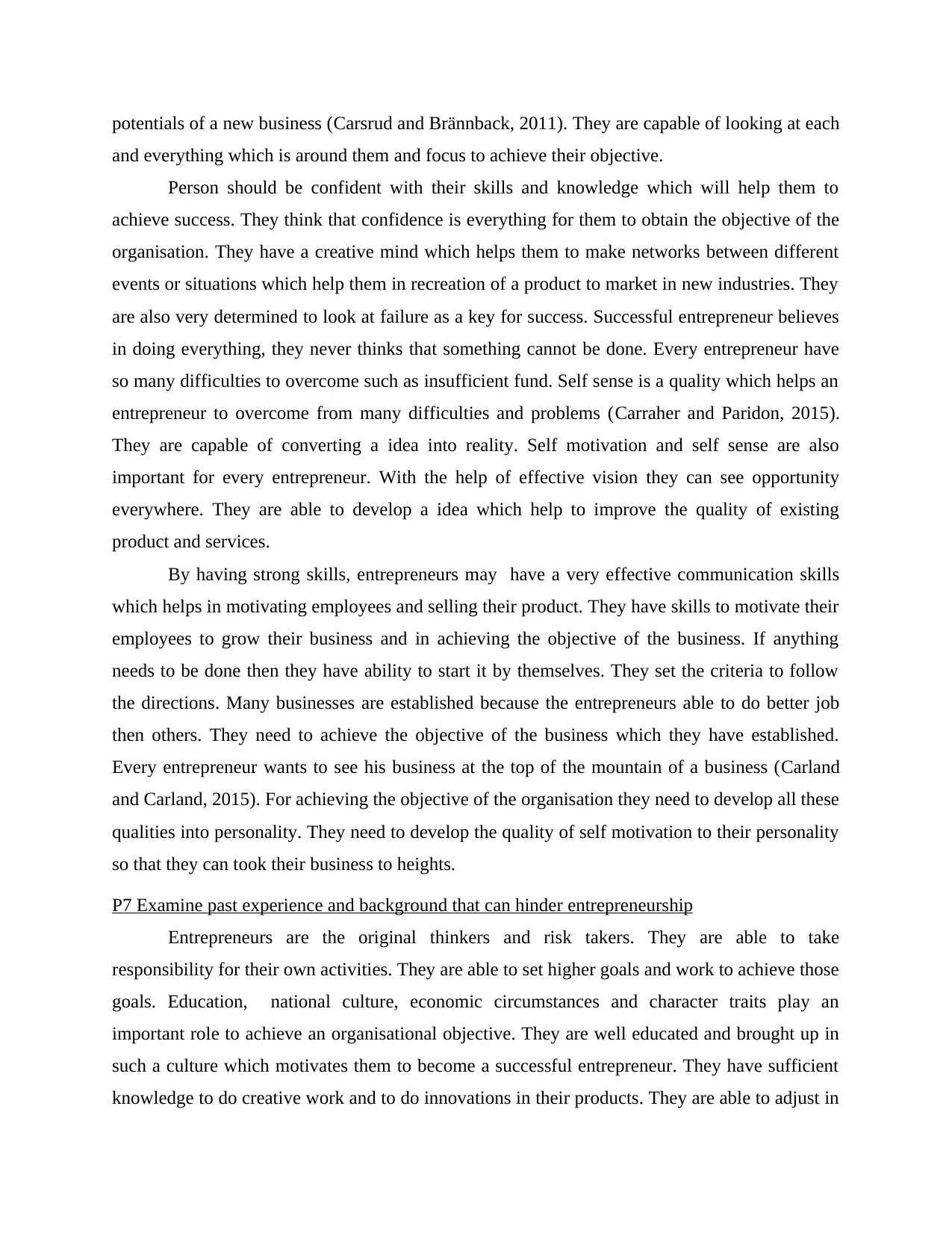
potentials of a new business (Carsrud and Brännback, 2011). They are capable of looking at each
and everything which is around them and focus to achieve their objective.
Person should be confident with their skills and knowledge which will help them to
achieve success. They think that confidence is everything for them to obtain the objective of the
organisation. They have a creative mind which helps them to make networks between different
events or situations which help them in recreation of a product to market in new industries. They
are also very determined to look at failure as a key for success. Successful entrepreneur believes
in doing everything, they never thinks that something cannot be done. Every entrepreneur have
so many difficulties to overcome such as insufficient fund. Self sense is a quality which helps an
entrepreneur to overcome from many difficulties and problems (Carraher and Paridon, 2015).
They are capable of converting a idea into reality. Self motivation and self sense are also
important for every entrepreneur. With the help of effective vision they can see opportunity
everywhere. They are able to develop a idea which help to improve the quality of existing
product and services.
By having strong skills, entrepreneurs may have a very effective communication skills
which helps in motivating employees and selling their product. They have skills to motivate their
employees to grow their business and in achieving the objective of the business. If anything
needs to be done then they have ability to start it by themselves. They set the criteria to follow
the directions. Many businesses are established because the entrepreneurs able to do better job
then others. They need to achieve the objective of the business which they have established.
Every entrepreneur wants to see his business at the top of the mountain of a business (Carland
and Carland, 2015). For achieving the objective of the organisation they need to develop all these
qualities into personality. They need to develop the quality of self motivation to their personality
so that they can took their business to heights.
P7 Examine past experience and background that can hinder entrepreneurship
Entrepreneurs are the original thinkers and risk takers. They are able to take
responsibility for their own activities. They are able to set higher goals and work to achieve those
goals. Education, national culture, economic circumstances and character traits play an
important role to achieve an organisational objective. They are well educated and brought up in
such a culture which motivates them to become a successful entrepreneur. They have sufficient
knowledge to do creative work and to do innovations in their products. They are able to adjust in
and everything which is around them and focus to achieve their objective.
Person should be confident with their skills and knowledge which will help them to
achieve success. They think that confidence is everything for them to obtain the objective of the
organisation. They have a creative mind which helps them to make networks between different
events or situations which help them in recreation of a product to market in new industries. They
are also very determined to look at failure as a key for success. Successful entrepreneur believes
in doing everything, they never thinks that something cannot be done. Every entrepreneur have
so many difficulties to overcome such as insufficient fund. Self sense is a quality which helps an
entrepreneur to overcome from many difficulties and problems (Carraher and Paridon, 2015).
They are capable of converting a idea into reality. Self motivation and self sense are also
important for every entrepreneur. With the help of effective vision they can see opportunity
everywhere. They are able to develop a idea which help to improve the quality of existing
product and services.
By having strong skills, entrepreneurs may have a very effective communication skills
which helps in motivating employees and selling their product. They have skills to motivate their
employees to grow their business and in achieving the objective of the business. If anything
needs to be done then they have ability to start it by themselves. They set the criteria to follow
the directions. Many businesses are established because the entrepreneurs able to do better job
then others. They need to achieve the objective of the business which they have established.
Every entrepreneur wants to see his business at the top of the mountain of a business (Carland
and Carland, 2015). For achieving the objective of the organisation they need to develop all these
qualities into personality. They need to develop the quality of self motivation to their personality
so that they can took their business to heights.
P7 Examine past experience and background that can hinder entrepreneurship
Entrepreneurs are the original thinkers and risk takers. They are able to take
responsibility for their own activities. They are able to set higher goals and work to achieve those
goals. Education, national culture, economic circumstances and character traits play an
important role to achieve an organisational objective. They are well educated and brought up in
such a culture which motivates them to become a successful entrepreneur. They have sufficient
knowledge to do creative work and to do innovations in their products. They are able to adjust in
⊘ This is a preview!⊘
Do you want full access?
Subscribe today to unlock all pages.

Trusted by 1+ million students worldwide
1 out of 16
Related Documents
Your All-in-One AI-Powered Toolkit for Academic Success.
+13062052269
info@desklib.com
Available 24*7 on WhatsApp / Email
![[object Object]](/_next/static/media/star-bottom.7253800d.svg)
Unlock your academic potential
Copyright © 2020–2026 A2Z Services. All Rights Reserved. Developed and managed by ZUCOL.





